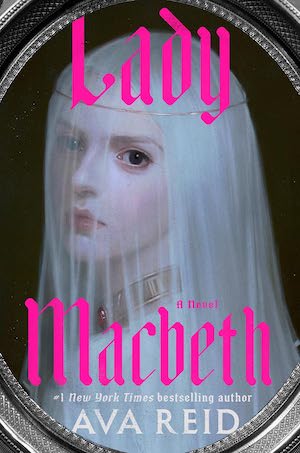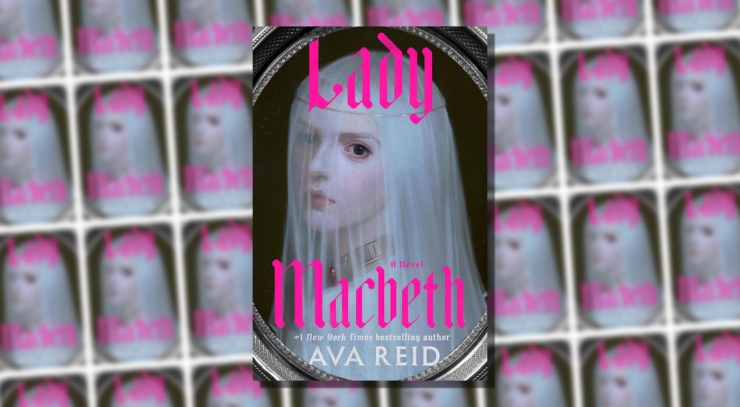Whether you’re a fan of Shakespeare or not, whether you’ve read Macbeth in school or not, you’ll probably have heard of Lady Macbeth, well known as one of Shakespeare’s most formidable villains. Wife to the titular Macbeth in the play, she is his partner in crime, his intellectual equal and the aggressive driving force in his life, his rise and eventual fall. To take on Lady Macbeth as a protagonist is no mean feat: How do you build on an already remarkable, complex, canonical character without annoying readers who loved the version they knew?
You can’t, of course. And so Ava Reid doesn’t. While Lady Macbeth is being touted as a reimagining of Macbeth, it most definitely veers very far from the canon, and while the story takes its main characters from the same history Shakespeare mined, this novel is very much its own beast with its own unique nature. Read it for its own strength, and it is delicious. Expect more of the Shakespearean Macbeth from it, and it may be frustrating. It’s important to remember that Shakespeare took liberties with history when he wrote his play, and so Reid does the same, but maintains certain core elements. The novel, like the play, is set in Scotland, and there are three witches who predict that Macbeth will be “King Hereafter” and that he will never be defeated by a man of woman born, until the woods come to the castle etc. But these are surface level similarities. In the play, Lady Macbeth is a villain who may have had a tragic past, and is now a woman fueled by ambition. She has agency, drive, determination and power—and of course, a famous breakdown. Ava Reid’s Lady Macbeth is instead a 17 year old girl attempting to survive an aggressively patriarchal warring society, in a dark, gothic fantasy that examines a young woman’s attempts to become more than “a panicked beating heart” in an ugly brutal world.
Roscille is sent off to form an alliance via marriage to the Scottish lord Macbeth, a hulking, almost Bluebeard-like much older man who “looks as if he grew right out of the rocks” of the cliff atop which his massive stone castle sits. Roscille is preternaturally beautiful; hers is a beauty that is said to be “death-touched. Poison-eyed. Witch-kissed,” with a gaze that can “drive mortal men to madness.” And so she is made to wear a veil around every man, including her new husband. Macbeth is initially indulgent of her, as she tries to navigate her aggressively male new home and household. Roscille learns very quickly that her new lord is a complicated man with secrets, such as the “second world hidden beneath his castle, [with] witches in chains, forced to parrot out his prophecies. He is slippery like the cold side of a cliff. And layered, like striated bands of erosion, green and white and rust-coloured lash-marks of the sea. Each time she thinks she knows him, the water level lowers, and another shade is revealed.”
Buy the Book


Lady Macbeth
Macbeth’s in-house witches’ prophesies do indeed come true, as one would expect, but with young Roscille unexpectedly at the centre of them all. She starts off as a girl with a very limited view of the world, but a clear understanding that survival is key, and she must learn the lay of this new land fast, if she is to manipulate the court to her advantage. We see her being used as a pawn by the men around her; from her father to her husband, she is defined by their plans and ambition. She is a young woman villainized for the purpose of a man’s ambition, “her magic, blooming at the cultivation of men”—something that has been seen repeatedly in history. Macbeth is not looking for a partner in his wife; he is looking for a tool to get what he wants. There is a constant underlying threat of violence emanating from him that runs through the novel, making every interaction between them fraught with tension. “Is this what it means, truly, to be Lady Macbeth?” questions Roscille, “Sorceress, murderer, the dagger in her husband’s hand?”
But as the prophecies roll out, Roscille stars to question whether she can be her own self or not: Can she truly ensorcel men with her gaze? What is this connection she feels to the witches? Why does her husband insist that he can “smell the power on [her] like smoke from a pyre… that flesh-burning scent?” We see her evolve from a clumsy girl being pushed along, to realising that she has something Macbeth does not, that none of the men do, and she can use it to stop him, to perhaps save herself. “So many secrets,” she thinks, “so many lies, spreading out in all directions, tying her to one man or another… she is a creature in a conch shell, everything spiralling out from around her.”
Reid’s novel deals with the ideas of agency, womanhood and power. It is a complex, layered narrative, and while some readers may find Reid’s Lady Macbeth to be a fraction of the ambitious, aggressive woman Shakespeare’s was, this is a different story, of a young woman just coming into her own power. All her life, Roscille has been “muzzled… so as not to disturb the architecture of the world,” but in her husband’s home, a tool used for his ambitions, she realises that “perhaps her great mistake was trying to ape the power of mortal men.” Once she has accepted the presence of a different power, accepted that she can lean into what is intrinsic and natural to her, she finds that “there is another world, waiting beneath the one she knows. Here, in the darkness, she can walk without shielding her eyes.” She is unveiled and able to both see the world clearly, and show the world who she truly is.
Lady Macbeth is written in lush, rich prose that reflects the gothic atmosphere of the setting. Though Reid’s Lady Macbeth does not speak the famous “out damn spot” lines, there is a strong thread of imagery running through the novel that ties together water, blood, washing: A violent sea in constant flux roils beneath the castle; the witches are constantly washing something that somehow never becomes clean; Macbeth spills blood easily, readily; and Roscille acknowledges that “Vengeance is not a wooden cup that empties. It is a jewelled chalice which endlessly spills over.”
Ava Reid’s Lady Macbeth is more than the story of a girl defined by the men around her. It is the story of a girl who is trying to figure out where she stands, what she can change within an existing system where women are so heavily restricted. “For men there is no debt of blood which goes unpaid. If the world tips in another’s favour, it must be made to tip again,” explains Reid, “but the world is never in a woman’s favour. She cannot tip the scale. The only choice is: live the same mute, unjust life you have always lived, or tear apart the world itself.” Lady Macbeth is the story of a young woman learning to tear the world apart, not with justice but with vengeance.
Lady Macbeth is published by Del Rey.
Read an excerpt.










